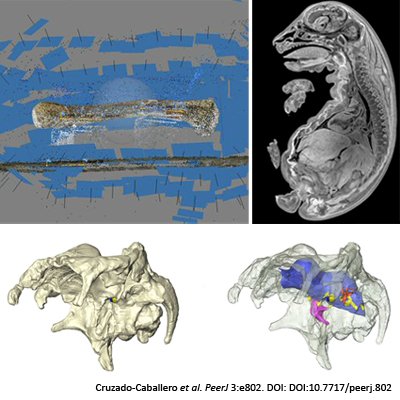
Submitted 27 January 2017 by Soledad De Esteban-Trivigno

This course is addressed to life sciences researchers and technicians who routinely work with complex biological structures (specimens) and need to digitise their samples for different reasons, such as digital preservation, quantitative or biomechanics analyses, etc. The goal of this course is to explain how you can work with a range of technologies with the aim of obtaining a 3D virtual models from different sources, such as laser imaging, photogrammetry and (micro) computed tomography (CT). By the end of the course participants should be able to obtain high quality digitalizations of samples with the most commonly used techniques and also be able to edit and manipulate the digital models that are produced. Attendees will also learn to stain with Lugol’s iodine, a specific technique for specimen preparation for micro CT scanning which maximizes soft-tissue differentiation in CT imaging datasets. DiceCT Online: https://dicect.com/.
DATES: June 26th-July 2nd, 2017.
PLACE: Barcelona (Spain).
Instructors: - Dr. Josep Fortuny (ICP and Muséum national d’Histoire naturelle, France). - Sergio Llácer (ICP, Spain). - Dr. Heinrich Mallison (Leibniz Institute for Research on Evolution and Biodiversity, Germany). - Dr. Paul Gignac (Oklahoma State University Center for Health Sciences, USA).
More information: http://www.transmittingscience.org/courses/imaging/introduction-3d-imaging-technologies-photogrammetry-laser-ct-scan-micro-ct-scan-life-sciences/
This course is organized by Transmitting Science and the Institut Català de Paleontologia.
Copyright © 2024 American Association of Biological Anthropologists.
Site programming and administration: Ed Hagen, Department of Anthropology, Washington State University